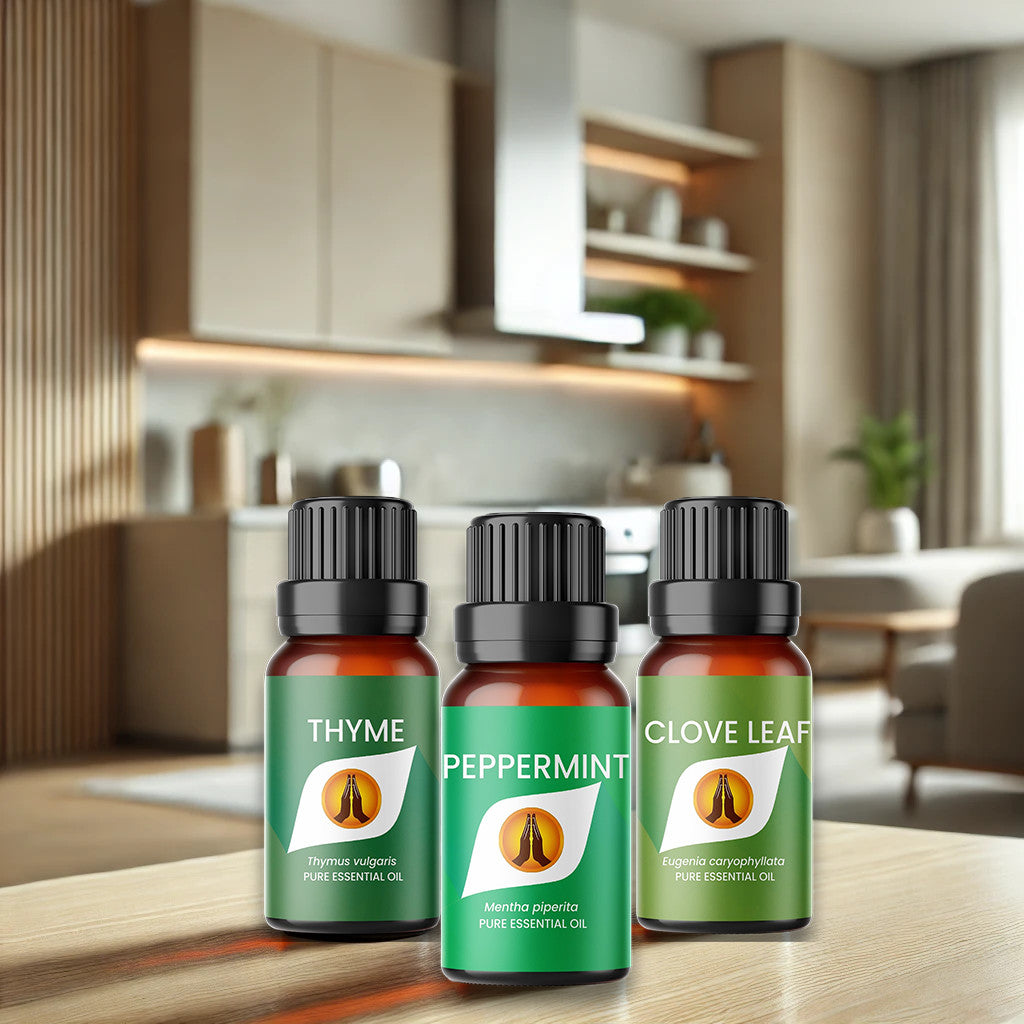
Natural Spider Repellents: How to Use Essential Oils to Keep Spiders Away
Share
Introduction:
Do spiders make you uneasy? You’re not alone! While spiders play a crucial role in controlling other pests, many of us prefer them to stay outside rather than in our homes. Fortunately, there are natural ways to keep spiders at bay using essential oils.
Using essential oils like Peppermint Oil offers a safe, effective, and pleasant-smelling alternative to chemical sprays. Not only do these oils repel spiders, but they also help to maintain a fresh, natural scent in your home. Keep reading to discover the best essential oils for the job, and how to use them to keep those creepy crawlies out for good.
Why Use Essential Oils to Repel Spiders?
Using essential oils to repel spiders is a fantastic natural alternative to chemical sprays. Not only are they safer for your family and pets, but they also provide a more pleasant aroma in your home. Essential oils work by overwhelming a spider's sensitive sense of smell, deterring them from entering your space.
Spiders, while useful for controlling pests, can often make their way into our homes, especially during certain seasons. That's where essential oils come in handy. The best part is that these oils aren’t just effective for spiders but can also deter other insects. Whether it's Peppermint Oil or Thyme Oil, these natural repellents offer a safe and effective method to keep your home spider-free.
Some of the best essential oils to repel spiders include:
- Peppermint Oil: A natural insecticide, peppermint oil is highly effective at repelling spiders.
- Thyme Oil: Known to repel other arachnids like ticks, thyme oil could help deter spiders.
- Clove Oil: Offers additional protection against both spiders and mites.
Not only do these oils smell wonderful, but they’re also environmentally friendly, making them an excellent addition to your spider-repelling arsenal.
Best Essential Oils to Repel Spiders
When it comes to using essential oils to repel spiders, some oils stand out more than others. Here’s a breakdown of the most effective essential oils and how they work:
1. Peppermint Oil
Peppermint Oil is one of the most popular and effective natural spider repellents. Spiders detest the strong, minty smell, making it a great option for keeping them out of your home. In fact, research has shown that peppermint oil can effectively repel two species of spiders.
- How to Use: Mix 10–15 drops of peppermint oil with 250 ml of water (approximately 1 cup) in a spray bottle. Add a dispersing agent like solubol for even distribution. Spray it along windows, doors, and other entry points where spiders are likely to crawl through.
2. Thyme Oil
While Thyme Oil is primarily known for repelling ticks and mites, it has the potential to keep spiders at bay as well. Its strong, herbaceous scent works wonders in areas prone to spider infestations.
- How to Use: Similar to peppermint, thyme oil can be mixed with water and sprayed in spider-prone areas.
3. Clove Oil
Clove Oil is another powerful essential oil that repels arachnids. It’s been found to be particularly effective against ticks, but many users have noted its usefulness for spiders as well.
- How to Use: Mix clove oil with water in a spray bottle, and apply it to potential spider entry points like windowsills and door frames.
4. Lemon Oil
Interestingly, Lemon Oil has been found to be ineffective at repelling spiders, despite its popularity. While it smells great, studies show it doesn't deter spiders like other essential oils do. However, lemon oil can still be useful for repelling other pests and freshening up your home.
Each essential oil offers a different method of protection, and combining a few can enhance your defense against spiders. Just remember to avoid using these oils if you or anyone in your household is allergic to them.

DIY Spider Repellent with Essential Oils
Making your own spider repellent using essential oils is simple, cost-effective, and a great natural alternative to store-bought sprays. Here’s how to create your very own spider-repelling spray using essential oils.
What You’ll Need:
- 10–15 drops of essential oil (such as Peppermint Oil, Thyme Oil, or Clove Oil)
- 250 ml of water (approximately 1 cup)
- 1 teaspoon of dispersing agent (such as solubol, to help mix the oils with water)
- A spray bottle
Instructions:
-
Mix the Essential Oils: Add 10–15 drops of your chosen essential oil into the spray bottle filled with water. Peppermint is a favorite for spider repellent, but you can mix it with Thyme or Clove Oil for a more potent blend.
-
Add the Dispersing Agent: Essential oils don’t mix well with water, so adding a dispersing agent helps ensure even distribution.
-
Shake Well: Before each use, shake the bottle well to ensure the oil is evenly mixed with the water.
-
Spray in Spider-Prone Areas: Spray the solution in areas where spiders are likely to enter or hide, such as doorways, windows, closets, and under furniture.
Where to Apply:
- Around window frames and doorways
- In closets, basements, and attics
- Near cracks, corners, and dark, secluded areas where spiders tend to lurk
How Often to Reapply:
For best results, reapply the spray every 2-3 days, especially in high-risk areas or during warmer months when spiders are more active.
By using this DIY method, you can create an effective, natural spider repellent that’s safe for your family and pets, all while making your home smell fresh with essential oils.

Do Essential Oils Really Repel Spiders? The Science Behind It
Many people turn to essential oils as a natural alternative to chemical repellents, but do they actually work in repelling spiders and other pests? While there is limited research specifically focused on spiders, several studies have explored the effectiveness of essential oils against arachnids and other related pests, such as ticks and mites. Here, we dive into the scientific evidence behind using essential oils as repellents.
1. Natural Compounds as Spider Repellents: Fact or Myth?
A study titled Natural Compounds as Spider Repellents explores the repellent effects of natural substances like essential oils on spiders. While spiders aren’t insects, they share some common repellent triggers with insects, such as sensitivity to strong odors like peppermint and chestnut. The study highlights the potential of natural compounds, particularly peppermint oil, to repel certain species of spiders, making it a valuable tool in your natural repellent arsenal.
2. The Repellent Efficacy of Eleven Essential Oils Against Adult Ticks
While this study primarily focuses on ticks, it provides valuable insights into the potential of essential oils to repel arachnids. The research, titled The Repellent Efficacy of Eleven Essential Oils Against Ticks, found that essential oils such as thyme and clove were particularly effective. Since ticks are closely related to spiders, this suggests that these oils could also repel spiders.
3. Acaricidal Activity and Synergistic Effect of Thyme Oil Constituents Against Carmine Spider Mites
Thyme oil has been widely studied for its ability to repel and kill mites, which are another relative of spiders. The study on Acaricidal Activity of Thyme Oil shows the strong pesticidal properties of thyme oil against spider mites, hinting at its potential effectiveness against spiders as well. The components of thyme oil, such as thymol and carvacrol, are believed to have powerful repellent effects.
4. Efficacy of Nanoencapsulated Thyme Oils Against Tetranychus urticae
This study, Efficacy of Nanoencapsulated Thyme Oils, explores how thyme oil, when encapsulated with a nanoparticle carrier, enhances its stability and efficacy against mites. Though the research focuses on mites, the results indicate that thyme oil's effectiveness could extend to spiders, given their shared biological characteristics.
5. Evaluation of DEET and Eight Essential Oils for Repellency Against Lone Star Tick Nymphs
Another relevant study, Evaluation of DEET and Essential Oils, tested the repellent effects of eight essential oils, including sandalwood and clove, against ticks. Though DEET outperformed essential oils, clove oil showed significant repellent effects, supporting its use as a natural alternative for repelling arachnids, including spiders.
These studies provide promising evidence that essential oils, particularly peppermint, thyme, and clove, can repel spiders and other arachnids. While research specifically focused on spiders is still limited, the repellent effects observed in related species suggest that essential oils can be an effective and natural method for keeping spiders out of your home.
FAQs: Common Questions About Using Essential Oils to Repel Spiders
1. Does peppermint oil really work against spiders?
Yes, peppermint oil is one of the most effective essential oils for repelling spiders. Its strong scent overwhelms spiders, causing them to avoid areas where it's used. Studies have shown that peppermint oil can successfully repel certain species of spiders.
2. How often should I apply the essential oil spray?
For optimal results, apply the essential oil spray every 2–3 days. This ensures that the scent remains strong enough to repel spiders. If you notice more spiders during certain seasons (like late summer or autumn), consider applying the spray more frequently.
3. Can I use essential oils if I have pets?
While essential oils are a natural alternative, some oils can be harmful to pets, especially cats. Peppermint Oil and Thyme Oil should be used with caution around pets. Ensure your home is well-ventilated when applying the spray, and keep pets away from areas where it’s freshly applied.
4. Which essential oil is the most effective for repelling spiders?
Peppermint Oil is considered the most effective oil for repelling spiders, with strong anecdotal and research-backed support. Other options, like Thyme Oil and Clove Oil, can also be effective.
5. Can I use lemon oil to repel spiders?
Surprisingly, lemon oil has not been proven effective in repelling spiders. Despite its popularity for other uses, a study showed that lemon oil did not repel any of the spider species tested.
6. Are essential oils safe to use in households with children?
Essential oils like peppermint and clove are generally safe when used in diluted amounts. However, always ensure that essential oil sprays are kept out of reach of young children and are applied in well-ventilated areas.
7. Do I need to use a dispersing agent in the spray?
Yes, a dispersing agent like solubol helps to properly mix the essential oils with water, ensuring the solution is evenly distributed when you spray it. Without it, the oils might float on the water surface, making the spray less effective.
8. Can I combine different essential oils in one spray?
Absolutely! You can combine oils like peppermint, thyme, and clove for a more potent spider-repelling spray. Combining oils can enhance the effectiveness and offer a unique scent.
9. Where should I spray the essential oil mixture?
Spray the essential oil solution along windowsills, doorways, closets, and any dark or hidden spots where spiders might enter or hide. Regular application in these areas will help keep spiders away from your home.
Conclusion
Essential oils offer a safe, natural, and pleasant-smelling solution for repelling spiders and keeping your home spider-free. Whether you choose peppermint oil, thyme oil, or clove oil, these oils are effective at deterring spiders while freshening up your space.
By creating a simple DIY spider repellent spray, you can use these oils to target the areas of your home where spiders are most likely to enter. Reapply every few days, and watch as spiders steer clear of your home. Remember to stay consistent, and feel free to experiment with different combinations of oils for the best results.
If you’re ready to start using essential oils in your home, check out the options linked throughout this guide, and give them a try! From peppermint to lemon, you have a variety of choices to suit your preferences.
For more tips on using essential oils, be sure to explore other related guides like the Comprehensive Guide to Peppermint Essential Oil or Thyme Essential Oil Uses for further insights.
